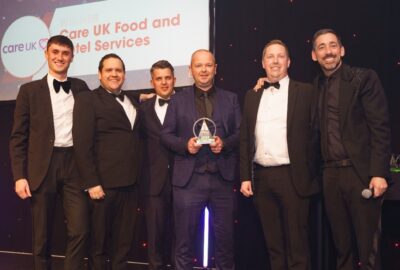According to Coeliac UK, the UK foodservice industry is losing out on an estimated £100million a year by not catering for people with coeliac disease and their friends and family.
With coeliac disease affecting 1 in 100 people in the UK, it’s vital that venues offer safe, gluten free options for diners, and those who do so successfully can reap the rewards in terms of revenue, with Mintel predicting the UK FreeFrom market is forecast to grow to £673million by 2020.
It’s a similar situation for people who suffer from food intolerances and allergies. There are an estimated 20million people in the UK living with allergic disease, and the consequences of an allergic reaction can be fatal. 90% of problems are caused by cows’ milk, eggs, wheat, peanuts, nuts, fish and shellfish.
Research by Allergy UK found that 92% of those living with a severe allergy are concerned about eating out as they have less control over what is going into their food.
The law You must by law, be able to provide customers with information on any allergens, including cereals containing gluten (namely wheat, rye, barley, oats and their hybridised strains), in all the dishes you serve.
You can provide allergen information in written or oral formats for non-prepacked foods. Where the information is not written and upfront, you must clearly signpost to where the information can be found.
Businesses choosing to provide information orally must ensure that there is a written notice, menu, ticket or label that is clearly visible, at the point that customers choose their food, to indicate that allergen information is available from a member of staff. For more details about the allergen requirements, visit www.food.gov.uk/allergen-resources.
What is gluten? Gluten is a protein found in the grains wheat, rye and barley. There is a similar protein found in oats which some people with coeliac disease also react to. Gluten is commonly found in foods made from flour, for example breads, pasta, biscuits, crackers and cakes. It can also be found in less obvious foods such as ready meals, sauces, sausages and soups.
GLUTEN FREE = 20mg/kg (ppm) or less
WHAT IS 20MG/KG (PPM)? One way to think of it is if your dish is a loaf of bread, 20mg/kg would be one crumb!
Universal appeal One of the secrets to success of catering for those with dietary requirements is to include menu items that appeal to as many diners as possible, advises Gordon Lauder, MD of frozen food distributor Central Foods.
“Food producers have really risen to the challenge and created a range of tasty products that are suitable for those with allergies and intolerances. This makes it so much easier for busy caterers to serve up meals, snacks and other items for those with specific diets, as well as removing some of the worry providing such dishes can naturally cause. It’s the same with vegetarian and vegan options – there’s a really wide range of products that are now available frozen.
“Increasingly items are being created for foodservice that will appeal to those with allergies, but which will also go down well with diners who have other dietary requirements or indeed diners in general.
“Having pre-prepared frozen items to hand that are suitable for those looking for FreeFrom options is extremely useful for caterers. It will ensure outlets avoid being caught out by unexpected demand and that they can fulfil customers’ expectations.”
Fergus Martin, development chef for Major International, agrees. “In any situation, it’s a good idea to have a percentage of your menu that is allergen/FreeFrom friendly. This can be done in several ways. First of all, make sure that you have a good balance of dishes to suit a range of needs; it’s no good having a menu that uses gluten in every dish for example. It is also good practice to try and reduce the amount of allergens in your main dishes wherever possible as long as this isn’t to the detriment of your business or the quality of the dish. Having a list of easily adaptable, standard recipes will make this easier and help your staff communicate allergens to customers more easily.”
Meat-free meals A recent poll estimated that 5.7% of the population is vegetarian. This means there are over three million vegetarians in the UK today.
It’s important to understand that there are different categories of vegetarian:
• Lacto-ovo-vegetarians – who eat both dairy products and eggs; this is the most common type of vegetarian diet. Many lacto-ovo vegetarians will only eat free-range eggs. because of welfare objections to the intensive farming of hens
• Lacto-vegetarians eat dairy products but avoid eggs
• Ovo-vegetarians – Eat eggs but not dairy products
Vegan options Over half a million people in the UK follow a vegan diet, according to The Vegan Society – that’s an increase of 360% since 2006. And now, thanks to the proliferation of plant-based options on menus, we can expect the number of people adopting plant-based, flexitarian and vegan diets to rise.
The RSPCA’s estimate of the UK vegan population is 3.5million, while NatCen’s British Social Attitudes survey reveals 44% of consumers are either not eating meat, reducing the amount they eat or are willing to cut down.
And yet, 9 out of 10 vegans still struggle to find food-to-go options, says Sarah Moor, brand manager for Lion Sauces. “Clearly there’s a huge opportunity here. Vegan diets are commonplace in many parts of the world, so use globally-inspired sauces and dips to create tempting dishes using authentic, traditional ingredients. Try Mexican-inspired sweet potato and white bean chilli made with Habanero Hot Sauce; glazed tempeh, bok choi and soba noodles infused with the flavours of garlic and ginger; or Korean BBQ pulled jackfruit wraps served with vegan slaw.”
Meat-Free Goes Mainstream, the latest Lion Flavour Forecast, is available from www.lionsauces.co.uk.
Scoop the opportunity In response to growing demand for FreeFrom desserts, Suncream’s new Love Vegan natural vanilla vegan ice cream is the perfect alternative to traditional dairy ice cream. Made with coconut oil, dextrose and real vanilla beans, and flecked with vanilla pod seeds for a rich, indulgent flavour, it’s free from all 14 declarable allergens including gluten, soya, nut, lactose and egg.
The dairy free Country Range Premium Sorbets are also a great choice for people following a FreeFrom diet. Available in two mouth-watering flavours – lemon and orange – and in handy 2 litre tubs, they’re made with Italian fruit purees for a true taste of luxury.
Make it easy Ready-made sauces are an ideal option and can cover all the bases. Dolmio and Uncle Ben’s ready-to-use foodservice sauces are suitable for a gluten free diet, as well as for vegetarians, and 12 out of the 18 sauces are also suitable for vegans.
Creating on-trend street food style options from scratch can be a great way for cafes to create a varied menu that caters to a wide range of dietary requirements and need not be time consuming. For example, Uncle Ben’s sauces can be used to create authentic Tex-Mex wrap fillings. Choose from Mexican Salsa, Chilli Con Carne, Hickory Smoked BBQ or Texan BBQ to create delicious Pulled Jackfruit Hickory Smoked BBQ wraps or shredded chicken in a baked gluten free tortilla wrap served with sweetcorn, coleslaw and a Mexican Salsa Dip for filling, yet quick lunchtime bites.
Kerrymaid has a range of products that can actively support those expanding their FreeFrom offering. Kerrymaid Cream Alternatives, Kerrymaid Custard, Kerrymaid Buttery and Kerrymaid Hollandaise and are all gluten free, enabling operators to provide for the growing population who are coeliacs and those customers choosing to follow free-from diets. As well as being gluten free, Kerrymaid Premium Baking is dairy free, and has been specifically designed for cakes, pastries and pies and is ideal for use in a busy kitchen, as it delivers on both taste and functionality.
Reach for the rice Rice is one of the foods least likely to cause allergies, making it a top choice for those who suffer from a gluten intolerance or coeliac disease.
Tilda’s Arborio Rice allows caterers to adapt their menus and offer a host of dishes from soups to salads to risottos and even desserts. Risottos can be indulgent, but also the perfect partner for the health-conscious diner – which is a growing consideration – if made with plenty of vegetables and lean proteins.
Staff training
• The FSA website has a free e-learning course on allergen management http://allergytraining.food.gov.uk/.
• Coeliac UK offers cost-effective training for caterers who want to learn more: www.glutenfreetraining.org.
• For practical guidance from Unilever Food Solutions on setting up your kitchen including a cross contamination checklist and information on getting gluten free accredited by Coeliac UK, visit https://www.unileverfoodsolutions. co.uk/chef-inspiration/gluten-free-made-simple/gluten-free-kitchen-guide.html .


